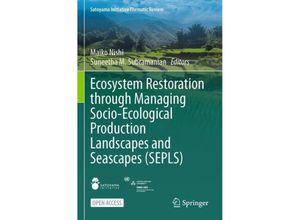This open access book is a compilation of case studies that provide useful knowledge and
lessons that derive from on-the-ground activities and contribute to policy recommendations
focusing on the relevance of social-ecological production landscapes and seascapes (SEPLS) to
ecosystem restoration. Building on the concept of SEPLS the Satoyama Initiative promotes
landscape approaches as integrative area-based strategies to bring together diverse
stakeholders aiming to balance multiple objectives including conservation and development for
the benefit of biodiversity and human well-being. Many of the SEPLS case studies from the
International Partnership for the Satoyama Initiative (IPSI) offer rich evidence to help guide
restoration efforts while advancing relevant knowledge and practices. The book highlights how
the efforts in managing SEPLS can contribute to ecosystem restoration and sustainable
development looking at the strategies and approaches by which multiple stakeholders express
negotiate and embrace their plural value perspectives of nature to restore ecosystems within a
landscape or seascape. It begins with an introductory chapter followed by twelve case studies
and a synthesis clarifying the relevance of the case study findings to policy and academic
discussions. This book will be of interest to scholars policymakers and professionals in the
field related to sustainable development especially on SDGs 15 and 17.



